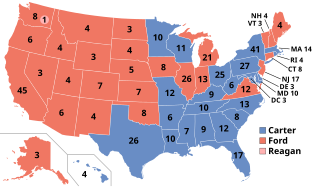
The 1976 United States presidential election was the 48th quadrennial presidential election, held on Tuesday, November 2, 1976. Democrat Jimmy Carter, former Governor of Georgia, defeated incumbent Republican president Gerald Ford in a narrow victory.

Mary Elizabeth Alexander Hanford Dole is an American attorney, author, and politician who served as a United States Senator from North Carolina from 2003 to 2009. A member of the Republican Party, she previously served in five presidential administrations, including as U.S. Secretary of Transportation under President Ronald Reagan from 1983 to 1987 and as U.S. Secretary of Labor under Reagan's successor, George H. W. Bush, from 1989 until 1990. Dole then left government to serve as president of the American Red Cross from 1991 to 1999; she departed from that position to seek the Republican nomination in the 2000 presidential election but eventually withdrew from the race.

The Hoover Institution is an American public policy think tank and research institution that promotes personal and economic liberty, free enterprise, and limited government. While the institution is formally a unit of Stanford University, it maintains an independent board of overseers and relies on its own income and donations. Fellowship appointments do not require the approval of Stanford tenure committees. It is widely described as a conservative institution, although its directors have contested its partisanship.
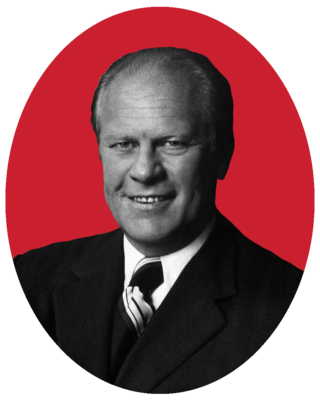
The 1976 Republican National Convention was a United States political convention of the Republican Party that met from August 16 to August 19, 1976, to select the party's nominees for president and vice president. Held in Kemper Arena in Kansas City, Missouri, the convention nominated President Gerald Ford for a full term, but only after narrowly defeating a strong challenge from former California Governor Ronald Reagan. The convention also nominated Senator Bob Dole from Kansas for vice president, instead of Vice President Nelson Rockefeller, who did not seek nomination for a full term. The keynote address was delivered by Tennessee Senator Howard Baker. Other notable speakers included Minnesota Representative Al Quie, retired Lieutenant Colonel and former Vietnam prisoner of war Raymond Schrump, former Texas Governor John Connally, Providence, Rhode Island mayor Vincent Cianci and Michigan Senator Robert P. Griffin. It is the last national convention by either of the two major parties to feature a seriously contested nomination between candidates.

Larry Melvin Speakes was an American journalist and spokesperson who acted as White House Press Secretary under President Ronald Reagan from 1981 to 1987. He assumed the role after Press Secretary James Brady was shot on March 30, 1981.
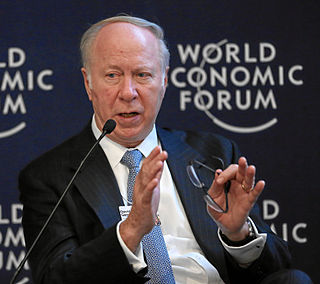
David Richmond Gergen is an American political commentator and former presidential adviser who served during the administrations of Richard Nixon, Gerald Ford, Ronald Reagan, and Bill Clinton. He is currently a senior political analyst for CNN and a professor of public service and the founding director of the Center for Public Leadership at the Harvard Kennedy School. Gergen is also the former editor at large of U.S. News & World Report and a contributor to CNN.com and Parade Magazine. He has twice been a member of election coverage teams that won Peabody awards—in 1988 with MacNeil–Lehrer, and in 2008 with CNN.

In political studies, surveys have been conducted in order to construct historical rankings of the success of the presidents of the United States. Ranking systems are usually based on surveys of academic historians and political scientists or popular opinion. The scholarly rankings focus on presidential achievements, leadership qualities, failures and faults. Popular-opinion polls typically focus on recent or well-known presidents.

The 1980 Republican National Convention convened at Joe Louis Arena in Detroit, Michigan, from July 14 to July 17, 1980. The Republican National Convention nominated retired Hollywood actor and former Governor Ronald Reagan of California for president and former Representative George H. W. Bush of Texas for vice president.

The Robert J. Dole Institute of Politics, often shortened to the Dole Institute, is a nonpartisan political institution located at the University of Kansas and founded by the former U.S. Senator from Kansas and 1996 Republican presidential candidate Bob Dole. Opened on July 22, 2003, Dole's 80th birthday, the institute's $11.3 million, 28,000-square-foot (2,600 m2) facility houses Dole's papers and hosts frequent political events. The institute is officially bi-partisan and has sponsored on-campus programs featuring prominent politicians of both major parties. The institute sponsors the Dole Lecture, which is given in April and features a prominent national figure addressing some aspect of contemporary politics or policy. The institute awards the annual Dole Leadership Prize each September, which includes a $25,000 cash award. The Presidential Lecture Series features the nation's leading presidential scholars, historians, journalists, and others including former Presidents, cabinet officers, and White House staff members who discuss the nation's highest office in ways that combine scholarly rigor with popular access. The archives hosted an exhibit in 2017 entitled "The League of Wives: Vietnam’s POW/MIA Allies & Advocates." In 2017, Elizabeth Dole gifted her career papers to the Dole Institute Archive and Special Collections.
These are the references for further information regarding the history of the Republican Party in the U.S. since 1854.

Gerald Rudolph Ford Jr. was an American politician who served as the 38th president of the United States from 1974 to 1977. He previously served as the leader of the Republican Party in the U.S. House of Representatives from 1965 to 1973, when he was appointed the 40th vice president by President Richard Nixon, after Spiro Agnew's resignation. Ford succeeded to the presidency when Nixon resigned in 1974, but was defeated for election to a full term in 1976. Ford is the only person to become U.S. president without winning an election for president or vice president.
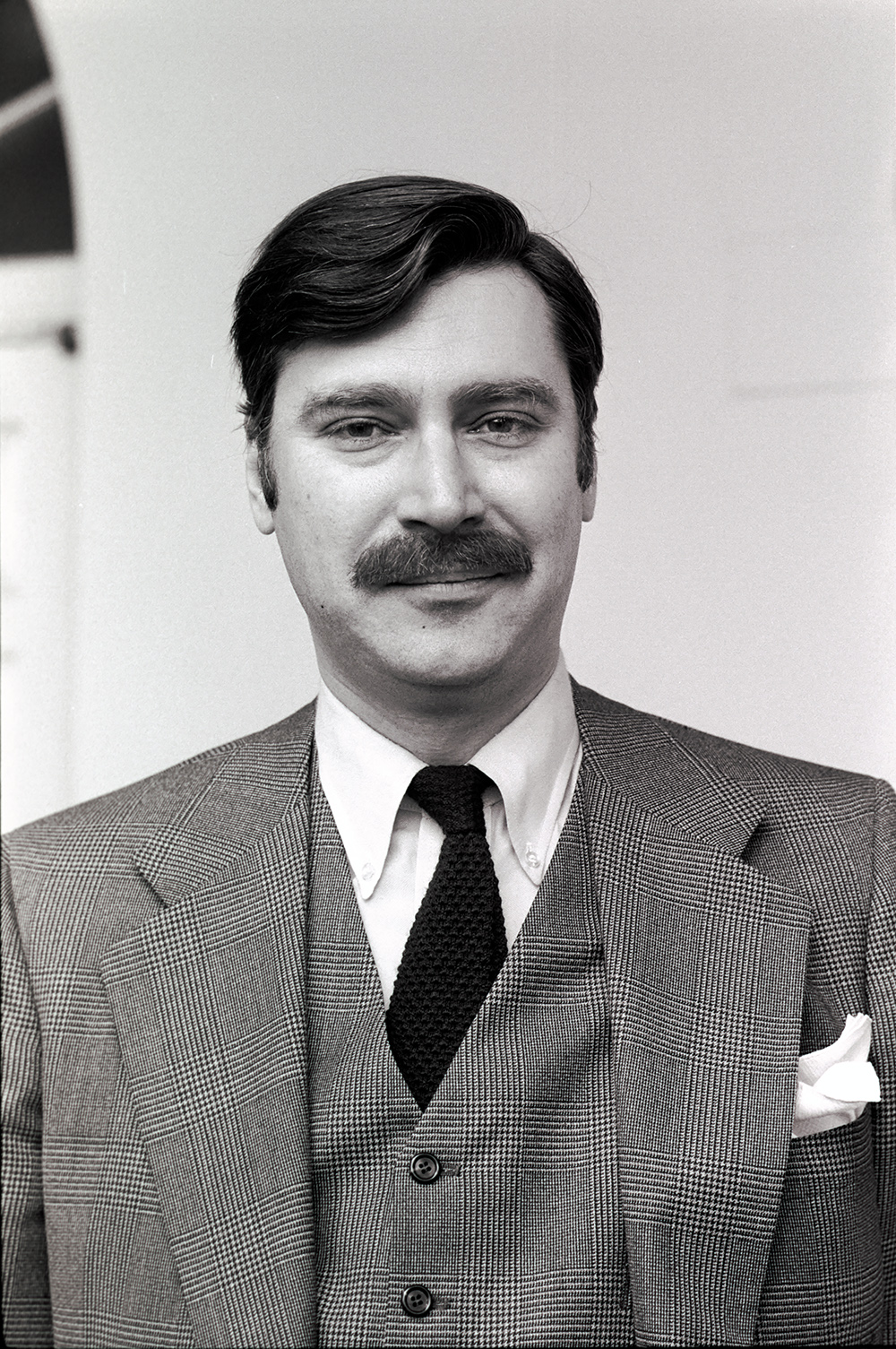
Aram Bakshian Jr. was an American political aide and speechwriter. He began his career working for Congressman Bill Brock (1966–70), then became a special assistant and speechwriter for Republican National Committee (RNC) Chairman Senator Bob Dole (1971). He joined the speechwriting staff of President Richard Nixon and, later, of President Ford (1972–75). He then became a senior consultant to Treasury Secretary William E. Simon (1976–77). Following his government service, Aram went on the lecture circuit as well as becoming a senior fellow at Harvard Kennedy School at Harvard University before being brought back for White House service.
Gleaves Whitney has been the executive director of the Gerald R. Ford Presidential Foundation since September 2020. Prior to that, he was the director of Grand Valley State University's Hauenstein Center for Presidential Studies beginning in July 2003. He has authored or edited 17 books. Whitney is also a senior scholar at The Imaginative Conservative in Houston, Texas, the first senior fellow at the Russell Kirk Center for Cultural Renewal, a member of the college of fellows at the Dominican School of Philosophy and Theology, Berkeley, a member of the Ronald Reagan Presidential Library's Leadership Development Committee, and a scholar with the Wyoming Catholic College committee of advisors. His work has appeared on blogs and in numerous newspapers, magazines, and journals.

From August 16 to August 19, 1976, voters of the Republican Party chose its nominee for president in the 1976 United States presidential election. The major candidates were incumbent President Gerald Ford and former Governor of California Ronald Reagan. After a series of primary elections and caucuses, neither secured a majority of the delegates before the convention.
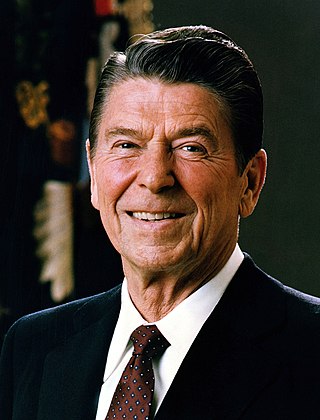
From January 21 to June 3, 1980, voters of the Republican Party chose its nominee for president in the 1980 United States presidential election. Retired Hollywood actor and two-term California governor Ronald Reagan was selected as the nominee through a series of primary elections and caucuses culminating in the Republican National Convention held from July 14 to July 17, 1980, in Detroit, Michigan.

On April 22, 1994, Richard Milhous Nixon, the 37th president of the United States, died after suffering a stroke four days earlier, at the age of 81.
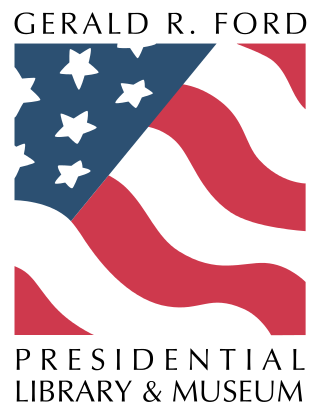
The Gerald R. Ford Presidential Museum is the presidential museum and burial place of Gerald Ford, the 38th president of the United States (1974–1977), and his wife Betty Ford. It is located near the Pew Campus of Grand Valley State University in Grand Rapids, Michigan. Ford's presidential museum is the only such facility under the auspices of the National Archives and Records Administration to be separate from the presidential library, which is located approximately 130 miles (210 km) to the east in Ann Arbor. Despite the separation, the library and museum are a single institution with one director.

This article lists those who were potential candidates for the Republican nomination for Vice President of the United States in the 1976 election. At the 1976 Republican National Convention, incumbent President Gerald Ford narrowly won the presidential nomination over former California Governor Ronald Reagan. Ford had decided not to choose Vice President Nelson Rockefeller as his running mate, due to Rockefeller's unpopularity with the right wing of the Republican Party. He instead chose Senator Bob Dole of Kansas. Dole was acceptable to the conservative wing of the party, and Ford hoped that Dole would help the ticket win the western states and the agricultural vote. The Ford–Dole ticket lost the general election to the Carter–Mondale ticket. Though he would not win the presidential nomination, Reagan announced before the convention that he would pick Senator Richard Schweiker of Pennsylvania as his running mate. Dole went on to become Senate Republican leader, and the Republican presidential nominee in 1996, losing the general election to incumbent President Bill Clinton.
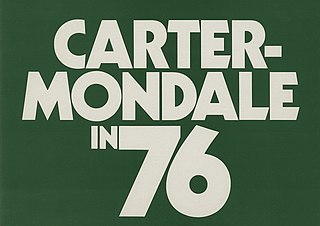
The 1976 presidential campaign of Jimmy Carter resulted in the election of Jimmy Carter and his running mate Walter Mondale as president and vice president of the United States, defeating incumbent Republican President Gerald Ford and his running mate Bob Dole. Carter, a Democrat and former governor of Georgia, launched his presidential bid in December 1974, as the Constitution of Georgia barred him from running for a second term as governor. In the wake of the Watergate scandal, the declining popularity of President Ford due to his pardon of Nixon, and the severe recession of 1974–75, many Democrats were sure of victory in the 1976 presidential election. As a result, 17 Democrats ran for their party's nomination in 1976. Carter's opponents mocked his candidacy by saying "Jimmy, who?", for his being relatively unknown outside Georgia. In response, Carter began saying "My name is Jimmy Carter, and I'm running for president." Carter extensively campaigned in the primaries, and in the end received 39.19% of his party's primary votes.


















